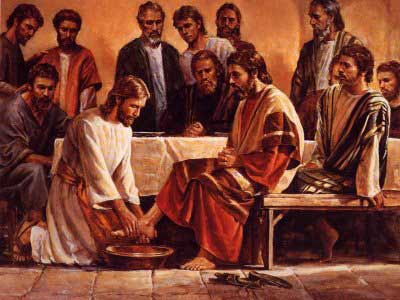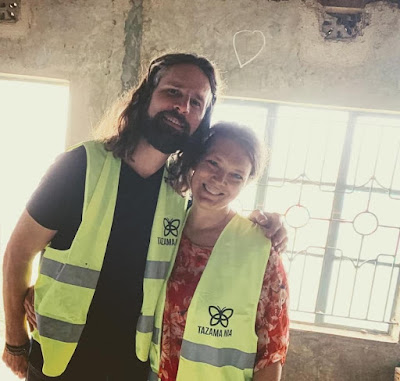Transformation/Reconciliation – Positioning for Discipleship (1 of 8)
Over the next couple of weeks I will be posting several reflections that pertain to our vision and are at the heart of why we live in Kenya. A lot of it compiles thoughts and practices about walking with the marginalized poor but I believe it can relate to anyone's search for truth and meaning. I thought it appropriate to try and tie my thoughts together with the upcoming Easter season. I invite you to join us in reflecting on our journey as we seek to share the Gospel - the good news about our Savior Jesus. Hope you get something out of it. Here is the 1st of 8: Transformation/Reconciliation – Positioning for Discipleship.
 Why did Jesus come to earth?
Why did Jesus come to earth?
I recently got to attend a virtual workshop, "Helping the Poor to Flourish" hosted by the Chalmers Center, Made to Flourish network, facilitated by Brian Fikkert - author "When Helping Hurts". In this seminar we were challenged to answer a fundamental question, "why did Jesus come to earth?" The most common answers were in the vain of, "to die on the cross and save us from our sins." The discussion went on that while this answer is true, Jesus' message is even more broad and talks about himself as being the King that came to reconcile all things back to himself:15 He is the image of the invisible God, the firstborn of all creation. 16 For by him all things were created, in heaven and on earth, visible and invisible, whether thrones or dominions or rulers or authorities—all things were created through him and for him. 17 And he is before all things, and in him all things hold together. 18 And he is the head of the body, the church. He is the beginning, the firstborn from the dead, that in everything he might be preeminent. 19 For in him all the fullness of God was pleased to dwell, 20 and through him to reconcile to himself all things, whether on earth or in heaven, making peace by the blood of his cross. Colossians 1:15-20
Isn't that an appropriate passage while we approach Easter, as we reflect on his sacrifice and celebrate his resurrection? Makes me want to know him more deeply and tell others about him, this loving creator and ruler of all things. So what are we to do with this? What should be our response?
One way that Christians would find a response is that we, the church, should walk with each other in this reconciliation or transformation (defined as a changed people and changed relationships - this fundamentally includes our relationship with God). Transformation or the reconciling of all things, effectively happens through God's work inviting the church, the body of Christ, to get in discipleship relationships with others, just as Jesus modeled for us with his followers/disciples.
- we should constantly be seeking engagements that “position us for discipleship”
These thoughts are rooted in our obedience to what is phrased the
Great Commission “go and make disciples”
(Matthew 28:19-20); which was proclaimed some 40 days after Jesus' resurrection, Easter. In this mission,
we should constantly seek engagements that “position
us for discipleship” - these are efforts
that allow us to build relationships with people and the community and that will lead to a friendship that eventually
leads people to a transformed relationship with Jesus Christ. Saying, "let's walk together, watch me as I follow Jesus."
As people make the decision to follow Jesus, a physical church is not the end goal.
Transformation through discipleship is the goal. Discipleship breeds every wrinkle of
transformation. The church, a group of people, is the natural outcome of transformation and
the vehicle by which God ordains the hope in “The Kingdom one day.” It represents and reflects the transformation that
occurs within a community. The church is the community that celebrates and encourages the reconciliation of all things back to God.
In Acts 1-3 the author Luke is concerned with discipleship and Christian community. God’s plan is not just that the gospel will go to all peoples, but that all peoples will be brought together through the gospel to form one people in Christ. God is calling the peoples of the world to share in community that includes their enemies and reconciles them with those who worship and live in other ways. The universalistic elements of Luke’s theology have implications not only on missiology, but also for ecclesiology (‘how we do church’) and the social interaction within the church.[1]
Being made in God’s image, we are image bearers of God. The end goal of transformation is to help
others know this and to live this out – to fulfill their God given purpose,
identity and vocation through a relationship with Jesus. We, the church, are involved through
discipleship - to be a renewed person and renew our relationships with God,
self, others, the community and the environment.
- we are merely participants in God's story
We should remind ourselves that we are not
the agents that cause transformation.
God, the Holy Spirit is the one who transforms. We are merely participants
in God’s story. Our role is to go where
God is, to be “Kingdom focused” –
We still wait for the visible, bodily presence of Christ, but that does
not mean the kingdom is not present at all right now. Though its fullness has
not yet been realized, the kingdom has come, and, indeed, it continues to come
as lives are transformed by the power of the Spirit. Our Savior has kept His
promise that the apostles would taste the kingdom before their deaths, and
today we too taste God's kingdom in our lives. (TT-Ligonier Ministries)
As the church, we
are looking to join in what God is already doing. To be part of the work of Christ's reconciliation of all things. Before we endeavor
to plant churches she ought to be asking, “where is God already being active?” and
go there. Transformational development
work and principles help us to know and see the hand of God. Myers defines this as “Recognizing the
fingerprints of God” [2]
– he reminds us that God has been witnessing all along (John 1:10). We need to
use every conversation, every program activity, each moment of crisis, every glimpse of transformation in the Kingdom of God, as an opportunity to point to
the work of Christ; to invite others into a relationship with him. We term this –
positioning for discipleship.
We celebrate his birth and life, overwhelmed by his death and rejoice in his resurrection. Jesus, our King, having established his kingdom is still working and invites us to join him in his work until the fullness of his kingdom will one day be complete.
Over the next few days I'll post thoughts in defining poverty, the role of the church in addressing poverty, root causes of poverty, justice, funding programs and partnerships...
See the post from March 9th for a deeper dive: "Vision - the Pastoral Circle"
We celebrate his birth and life, overwhelmed by his death and rejoice in his resurrection. Jesus, our King, having established his kingdom is still working and invites us to join him in his work until the fullness of his kingdom will one day be complete.
Over the next few days I'll post thoughts in defining poverty, the role of the church in addressing poverty, root causes of poverty, justice, funding programs and partnerships...
See the post from March 9th for a deeper dive: "Vision - the Pastoral Circle"

